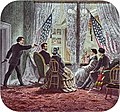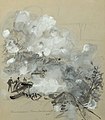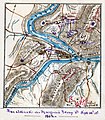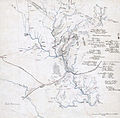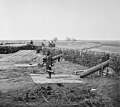Portal:American Civil War
 |
 |
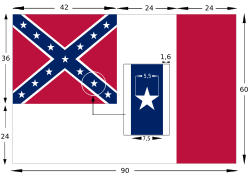
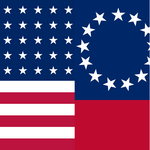
The American Civil War (1861–1865) was a sectional rebellion against the United States of America by the Confederate States, formed of eleven southern states' governments which moved to secede from the Union after the 1860 election of Abraham Lincoln as President of the United States. The Union's victory was eventually achieved by leveraging advantages in population, manufacturing and logistics and through a strategic naval blockade denying the Confederacy access to the world's markets.
In many ways, the conflict's central issues – the enslavement of African Americans, the role of constitutional federal government, and the rights of states – are still not completely resolved. Not surprisingly, the Confederate army's surrender at Appomattox on April 9,1865 did little to change many Americans' attitudes toward the potential powers of central government. The passage of the Thirteenth, Fourteenth and Fifteenth amendments to the Constitution in the years immediately following the war did not change the racial prejudice prevalent among Americans of the day; and the process of Reconstruction did not heal the deeply personal wounds inflicted by four brutal years of war and more than 970,000 casualties – 3 percent of the population, including approximately 560,000 deaths. As a result, controversies affected by the war's unresolved social, political, economic and racial tensions continue to shape contemporary American thought. The causes of the war, the reasons for the outcome, and even the name of the war itself are subjects of much discussion even today. (Full article)
The 211th Regiment Pennsylvania Volunteer Infantry was an infantry regiment of the Union Army in the American Civil War. Raised in western Pennsylvania in September 1864, the regiment initially served with the Army of the James during the Siege of Petersburg, holding trenches at Bermuda Hundred. In late November it transferred to the Army of the Potomac and during the northern hemisphere spring campaign fought in the counterattack during the Battle of Fort Stedman and the Union breakthrough at Petersburg. During the last days of the Appomattox Campaign it guarded trains, and participated in the Grand Review of the Armies following the end of the war before mustering out. (Full article...)
The state of Iowa played a significant role during the American Civil War in providing food, supplies, troops and officers for the Union army. (Full article...)

Neal Dow (March 20, 1804 – October 2, 1897) was an American Prohibition advocate and politician. Nicknamed the "Napoleon of Temperance" and the "Father of Prohibition", Dow was born to a Quaker family in Portland, Maine. From a young age, he believed alcohol to be the cause of many of society's problems and wanted to ban it through legislation. In 1850, Dow was elected president of the Maine Temperance Union, and the next year he was elected mayor of Portland. Soon after, largely due to Dow's efforts, the state legislature banned the sale and production of alcohol in what became known as the Maine law. Serving twice as mayor of Portland, Dow enforced the law with vigor and called for increasingly harsh penalties for violators. In 1855, his opponents rioted and he ordered the state militia to fire on the crowd. One man was killed and several wounded, and when public reaction to the violence turned against Dow, he chose not to seek reelection.
Dow was later elected to two terms in the Maine House of Representatives, but retired after a financial scandal. He joined the Union Army shortly after the outbreak of the American Civil War in 1861, eventually attaining the rank of brigadier general. He was wounded at the siege of Port Hudson and later captured. After being exchanged for another officer in 1864, Dow resigned from the military and devoted himself once more to prohibition. He spoke across the United States, Canada, and Great Britain in support of the cause. In 1880, Dow headed the Prohibition Party ticket for President of the United States. After losing the election, he continued to write and speak on behalf of the prohibition movement for the rest of his life until his death in Portland at the age of 93. (Full article...)
- ... that Byron Root Pierce was Michigan's last living Civil War general?
- ... that the Confederate States Navy ordered six Squib-class torpedo boats from England, but they were never delivered?
- ... that Dubuque, Arkansas, was destroyed in the American Civil War and is now covered by the waters of Bull Shoals Lake?
- ... that Carter Moore Braxton fought for the Confederacy throughout the American Civil War and, according to one report, had seven horses killed under him but avoided any wounds?
- ... that after the Little Rock campaign, Union forces held three-quarters of Arkansas?
- ... that The Land We Love, a little magazine that merged into Southern Magazine, printed American Civil War recollections, poetry, agricultural material, and many works by female authors?
- Attention needed
- ...to referencing and citation • ...to coverage and accuracy • ...to structure • ...to grammar • ...to supporting materials
- Popular pages
- Full list
- Cleanup needed
- The West Tennessee Raids
- Requested articles
- James Ashby (soldier) • Bluffton expedition • Benjamin D. Fearing • Charles A. Hickman • Richard Henry Jackson • James B. Speers • Charles S. Steedman • Battle of Barton's Station • Lawrence P. Graham • Thomas John Lucas • Daniel Henry Rucker • James Hughes Stokes • Frederick S. Sturmbaugh • Davis Tillson • Action at Nineveh (currently a redirect) • International response to the American Civil War • Spain and the American Civil War • Savannah Campaign Confederate order of battle • Native Americans in the American Civil War (currently disambiguation after deletion) • 1st Battalion, Mississippi Mounted Rifles (Union) • Battle of Lafayette • Requested American Civil War Medal of Honor recipients
- Expansion needed
- Battle of Boonsborough • Battle of Guard Hill • Battle of Rice's Station • Battle of Simmon's Bluff • Battle of Summit Point • Charleston Arsenal • Edenton Bell Battery • First Battle of Dalton • Blackshear Prison • Edwin Forbes • Hiram B. Granbury • Henry Thomas Harrison • Louis Hébert (colonel) • Benjamin G. Humphreys • Maynard Carbine • Hezekiah G. Spruill • Smith carbine • Edward C. Walthall • Confederate States Secretary of the Navy • Confederate States Secretary of the Treasury • David Henry Williams • Battle of Rome Cross Roads • Delaware in the American Civil War • Ironclad Board • United States Military Railroad • Kansas in the American Civil War • Rufus Daggett • Ebenezer Magoffin • Confederate Quartermaster-General's Department • First Corps, Army of Northern Virginia • Francis Laurens Vinton • Henry Maury • Smith's Expedition to Tupelo • Other American Civil War battle stubs • Other American Civil War stubs
- Images needed
- Battle of Lone Jack • Preston Pond, Jr. • Melancthon Smith
- Merging needed
- 1st Regiment New York Mounted Rifles and 7th Regiment New York Volunteer Cavalry
- Citations needed
- 1st Alabama Cavalry Regiment (Union) • 4th Maine Battery • 33rd Ohio Infantry • 110th New York Volunteer Infantry • Battle of Hatcher's Run • Camp Dennison • Confederate colonies • CSS Resolute • Dakota War of 1862 • Florida in the American Civil War • Ethan A. Hitchcock (general) • Fort Harker (Alabama) • Gettysburg (1993 film) • Iowa in the American Civil War • Second Battle of Fort Sumter • Samuel Benton
- Translation needed
- Add an article here!
The following Wikimedia Foundation sister projects provide more on this subject:
-
Commons
Free media repository -
Wikibooks
Free textbooks and manuals -
Wikidata
Free knowledge base -
Wikinews
Free-content news -
Wikiquote
Collection of quotations -
Wikisource
Free-content library -
Wikiversity
Free learning tools -
Wikivoyage
Free travel guide -
Wiktionary
Dictionary and thesaurus
- Shortcuts to this page: Portal:ACW • P:ACW





